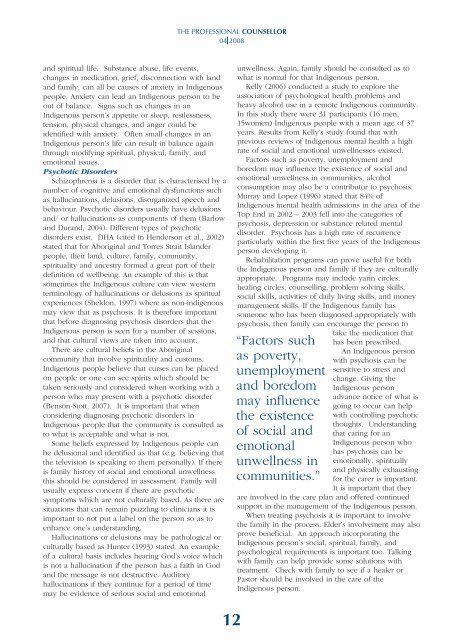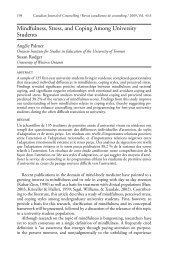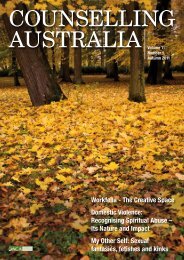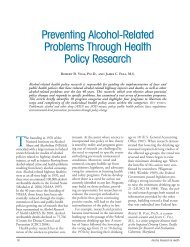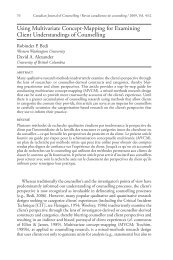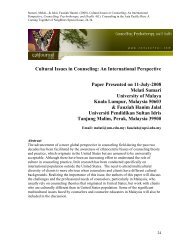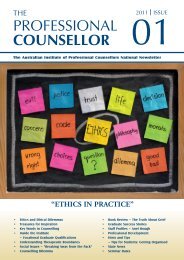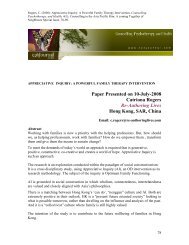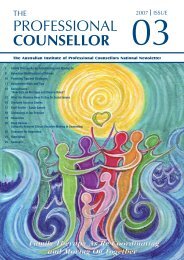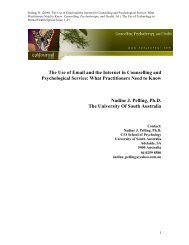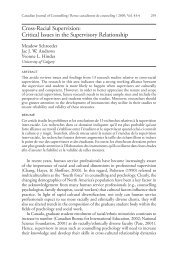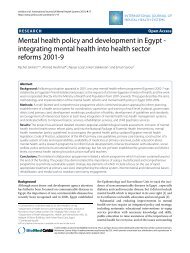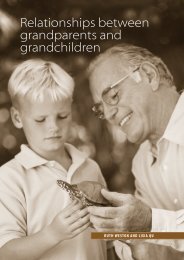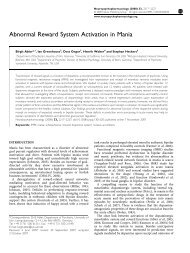Counselling Practice - Becoming a Reflective Practitioner
Counselling Practice - Becoming a Reflective Practitioner
Counselling Practice - Becoming a Reflective Practitioner
You also want an ePaper? Increase the reach of your titles
YUMPU automatically turns print PDFs into web optimized ePapers that Google loves.
THE PROFESSIONAL COUNSELLOR<br />
04 2008<br />
and spiritual life. Substance abuse, life events,<br />
changes in medication, grief, disconnection with land<br />
and family, can all be causes of anxiety in Indigenous<br />
people. Anxiety can lead an Indigenous person to be<br />
out of balance. Signs such as changes in an<br />
Indigenous person’s appetite or sleep, restlessness,<br />
tension, physical changes, and anger could be<br />
identified with anxiety. Often small changes in an<br />
Indigenous person’s life can result in balance again<br />
through modifying spiritual, physical, family, and<br />
emotional issues.<br />
Psychotic Disorders<br />
Schizophrenia is a disorder that is characterised by a<br />
number of cognitive and emotional dysfunctions such<br />
as hallucinations, delusions, disorganized speech and<br />
behaviour. Psychotic disorders usually have delusions<br />
and/ or hallucinations as components of them (Barlow<br />
and Durand, 2004). Different types of psychotic<br />
disorders exist. DHA (cited in Henderson et al., 2002)<br />
stated that for Aboriginal and Torres Strait Islander<br />
people, their land, culture, family, community,<br />
spirituality and ancestry formed a great part of their<br />
definition of wellbeing. An example of this is that<br />
sometimes the Indigenous culture can view western<br />
terminology of hallucinations or delusions as spiritual<br />
experiences (Sheldon, 1997) where as non-indigenous<br />
may view that as psychosis. It is therefore important<br />
that before diagnosing psychosis disorders that the<br />
Indigenous person is seen for a number of sessions,<br />
and that cultural views are taken into account.<br />
There are cultural beliefs in the Aboriginal<br />
community that involve spirituality and customs.<br />
Indigenous people believe that curses can be placed<br />
on people or one can see spirits which should be<br />
taken seriously and considered when working with a<br />
person who may present with a psychotic disorder<br />
(Benson-Stott, 2007). It is important that when<br />
considering diagnosing psychotic disorders in<br />
Indigenous people that the community is consulted as<br />
to what is acceptable and what is not.<br />
Some beliefs expressed by Indigenous people can<br />
be delusional and identified as that (e.g. believing that<br />
the television is speaking to them personally). If there<br />
is family history of social and emotional unwellness<br />
this should be considered in assessment. Family will<br />
usually express concern if there are psychotic<br />
symptoms which are not culturally based. As there are<br />
situations that can remain puzzling to clinicians it is<br />
important to not put a label on the person so as to<br />
enhance one’s understanding.<br />
Hallucinations or delusions may be pathological or<br />
culturally based as Hunter (1993) stated. An example<br />
of a cultural basis includes hearing God’s voice which<br />
is not a hallucination if the person has a faith in God<br />
and the message is not destructive. Auditory<br />
hallucinations if they continue for a period of time<br />
may be evidence of serious social and emotional<br />
unwellness. Again, family should be consulted as to<br />
what is normal for that Indigenous person.<br />
Kelly (2006) conducted a study to explore the<br />
association of psychological health problems and<br />
heavy alcohol use in a remote Indigenous community.<br />
In this study there were 31 participants (16 men,<br />
15women) Indigenous people with a mean age of 37<br />
years. Results from Kelly’s study found that with<br />
previous reviews of Indigenous mental health a high<br />
rate of social and emotional unwellnesses existed.<br />
Factors such as poverty, unemployment and<br />
boredom may influence the existence of social and<br />
emotional unwellness in communities, alcohol<br />
consumption may also be a contributor to psychosis.<br />
Murray and Lopez (1996) stated that 84% of<br />
Indigenous mental health admissions in the area of the<br />
Top End in 2002 – 2003 fell into the categories of<br />
psychosis, depression or substance related mental<br />
disorder. Psychosis has a high rate of recurrence<br />
particularly within the first five years of the Indigenous<br />
person developing it.<br />
Rehabilitation programs can prove useful for both<br />
the Indigenous person and family if they are culturally<br />
appropriate. Programs may include yarin circles,<br />
healing circles, counselling, problem solving skills,<br />
social skills, activities of daily living skills, and money<br />
management skills. If the Indigenous family has<br />
someone who has been diagnosed appropriately with<br />
psychosis, then family can encourage the person to<br />
“Factors such<br />
as poverty,<br />
unemployment<br />
and boredom<br />
may influence<br />
the existence<br />
of social and<br />
emotional<br />
unwellness in<br />
communities.”<br />
take the medication that<br />
has been prescribed.<br />
An Indigenous person<br />
with psychosis can be<br />
sensitive to stress and<br />
change. Giving the<br />
Indigenous person<br />
advance notice of what is<br />
going to occur can help<br />
with controlling psychotic<br />
thoughts. Understanding<br />
that caring for an<br />
Indigenous person who<br />
has psychosis can be<br />
emotionally, spiritually<br />
and physically exhausting<br />
for the carer is important.<br />
It is important that they<br />
are involved in the care plan and offered continued<br />
support in the management of the Indigenous person.<br />
When treating psychosis it is important to involve<br />
the family in the process. Elder’s involvement may also<br />
prove beneficial. An approach incorporating the<br />
Indigenous person’s social, spiritual, family, and<br />
psychological requirements is important too. Talking<br />
with family can help provide some solutions with<br />
treatment. Check with family to see if a healer or<br />
Pastor should be involved in the care of the<br />
Indigenous person.<br />
12


